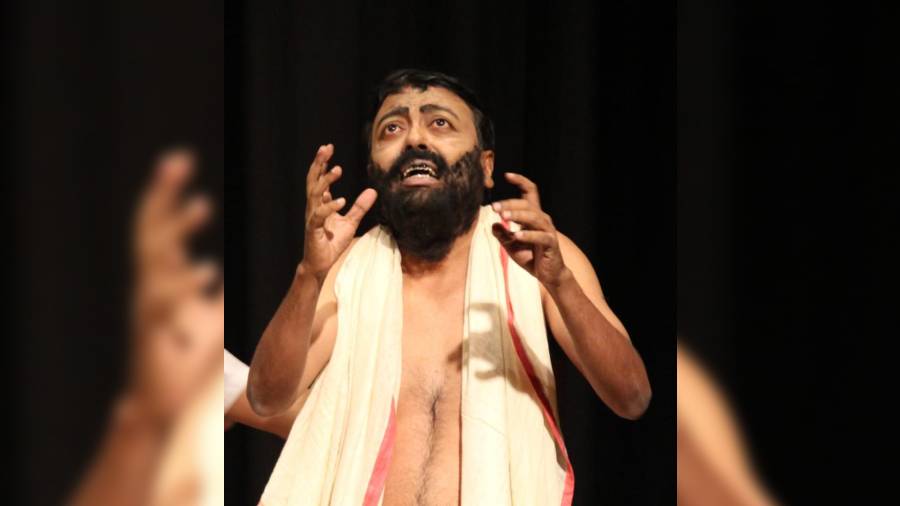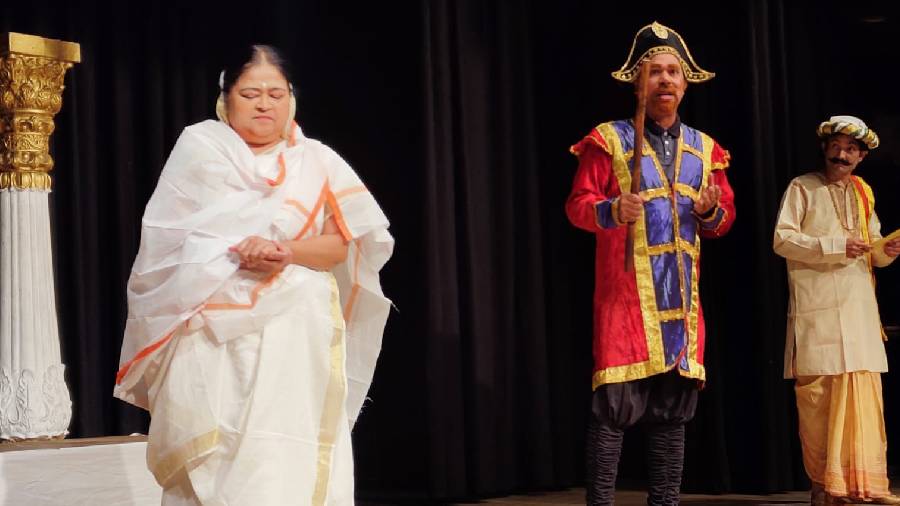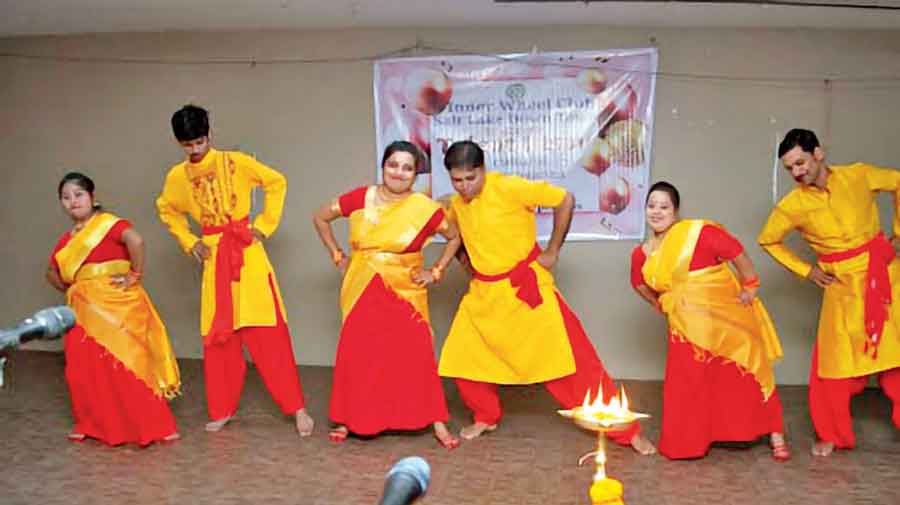The Inner Wheel Club of Salt Lake Downtown organised a Talent Utsav recently for differently abled children at Natghar of EZCC.
The programme almost did not happen. The club's booking for Aikatan auditorium, which was done well in advance, was cancelled at the last moment for “some other important programme”. “We had plans to display paintings and drawings made by these participants. So we felt very disappointed when we heard that our booking was cancelled. Ultimately EZCC director Ashis Kumar Giri offered us a smaller hall totally free of cost to host our show,” said club president Arpita Chatterjee.
Former district chairperson Sushmita Sarkar shared how the programme was initiated in 2003-04 at Anderson Club. It was taken up by the then president of Inner Wheel Salt Lake Downtown Reena Bhattacharya as a yearly event since 2004. “This programme generates immense satisfaction as we can showcase the creative talent of differently abled participants,” said Sarkar.
The show commenced with a choric rendition of Aguner parasmoni by senior members of the club. Then about 50 participants from Alokendu Bodh Niketan, Dum Dum Prayash, Workshop for the Blind, Bodhayan, Sunshine Autism Care and Behala Bodhayan entertained the audience through various performances.
Secretary Baishali Bhattacharya recalled how prizes were earlier given to the top three participants on the basis of their performances. “But we realised that all participants needed equal recognition for their inner potential which would motivate not only them but also their trainers, who are toiling day and night for their progress. So now we encourage each participant with some gift.”
Participants from Alokendu Bodh Niketan sang Amra ei bishwer buke gorbo rangmahal from the Bengali movie Uttoran. Students of Workshop for the Blind, draped in red-bordered silk sari, sang a folk song. Chandan Mukherjee from the Workshop for the Blind recited Tagore's poem Prashno while Radha Sarkar, another student of the Workshop, an MA in music from Rabindra Bharati University, added her voice to the group folk song Jhinga phooler sanjhite. “For the first time, I sang with track music at the insistence of our music trainer Sahela (Panja) madam. Now I am looking forward to take dance training from Esha (Goswami) madam because I am looking forward to see how she would train a blind person.”
Participants of Dum Dum Prayas were applauded for dancing to Rangila re. Mainstream dancers like Goswami, Sonali Basak and Sujit Sen joined them on stage for a group dance. “Such performances prove that they can be mainstreamed with proper support, training and care. Society needs to recognise that. Even family members don't treat them properly,” said Basak, the international service organiser of Inner Wheel Club Salt Lake.
Sujit Sen, a disciple of Malabika Sen and Kohinoor Sen Barat who is a special educator in several organisations, pointed out that such programmes help these children gain acceptance in society and enhance their capability and quality of life. “They are taught different skills for socialization -- how to maintain discipline and behave properly, how to respond to anybody — and as a result they are improving a lot. It's a positive sign that some renowned schools have started organising inclusive programmes, like intercultural meets,” said Sen.
Seven participants from Bodhayan performed to the Tagore song Tomar khola hawa while participants from Sunshine Autistic Care performed to Asadoma sadgamayo, sung by Arijit Singh in the film Khaad. The concluding acts were solo and group performances by Behala Bodhayan.
Founder of the Dum Dum Park-based organisation Sunshine Autism Care, Nilanjana Rambothu spoke of the special features of children with autism, for which they are segregated from all. She said 80 per cent of neurodiverse children are low functioning and they are mostly misunderstood as it is difficult to identify them until they show any inappropriate behaviour. “It is equally difficult to tackle them. We train these children so they lead a dignified life.”
All the participants were gifted a goodie bag.
Bharati Kanjilal
Salute to pioneers


Scenes from the play Sandhi kkhan staged by Baichitro Sourced by The Telegraph
Raja Rammohun Roy, Rani Rashmoni, Ramakrishna Paramhansa and Girish Chandra Ghosh walked the stage recently at Rabindra Okakura Bhavan with other contemporaries when Purbachal Cluster XIII-based socio-cultural group Baichitro enacted a play, titled Sandhikkhan.
The play was based on 19th century Bengal when several remarkable social reforms took place, from abolition of Sati at the behest of Rammohun Roy to the passage of the Hindu Widows' Remarriage Act after a strident campaign by Vidyasagar.
The play, written and directed by Jishu Bhatta, opened amid cries of young women forced to be burnt on the pyre of their husband as per custom, paving the way for Rammohun's appearance.
Rani Rashmoni is seen challenging the East India Company and also later going ahead with construction of the Dakshineswar Kali temple despite protests over her caste. The play also brought Ramakrishna face to face with Narendranath Dutta, the future Swami Vivekananda. Sanmitra Bhattacharya, who essayed Naren's role, brought out his emotional turmoil after the meeting thorugh the song Mon chalo nij niketane that he sang himself.
Another musical high point was Girish Ghosh singing Juraite chai kothay jurai in a scene with his discovery Noti Binodini and Ramakrishna who had come to see her enact the role of Chaitanya and blessed her for her phenomenal performance. The song, received with huge applause, was sung by Smritikamal Biswas, who sang all the Shyamasangeets used in the play. “I am not a professional singer. Singing and acting are my passion. Earlier I used to perform in inter-bank drama competitions. Now I am continuing that practice in this group in my retired life,” said the former Punjab National Bank employee who played the role of Mrityunjoy Bidyalankar.
Baichitro secretary Angshuman Roy, who played Sri Ramakrishna, was overwhelmed at receiving applause and great feedback from the audience. “Playing such a revered figure was tough for me since I am an amateur actor. But our director bought me books on Ramakrishna, asked me to practise meditation and eat vegetarian meals. I watched films on Ramakrishna on YouTube. Thankfully, everything went well,” said Roy.
Sanmitra, who played Vivekananda, said: “This was practically my debut on stage as earlier I had done only mime, audio drama and music shows. This was a great opportunity as Vivekananda is my Icon. I learnt so many things about stage performance — how to deliver dialogues, modulate voice and such other nuances,” said the first year student of Scottish Church College.
The director Jishu Bhatta looked satisfied after curtains. “This production is the result of two-three years of research. My objective was to create awareness about these historical phases. The practice of Sati may have ended but brides are still being burnt,” said Bhatta.
Bharati Kanjilal
WRITE IN on problems or issues related to the township and respond to articles appearing in this weekly tabloid to The Telegraph Salt Lake, 6, Prafulla Sarkar Street, Calcutta - 700001 or e-mail to saltlake@abp.in
